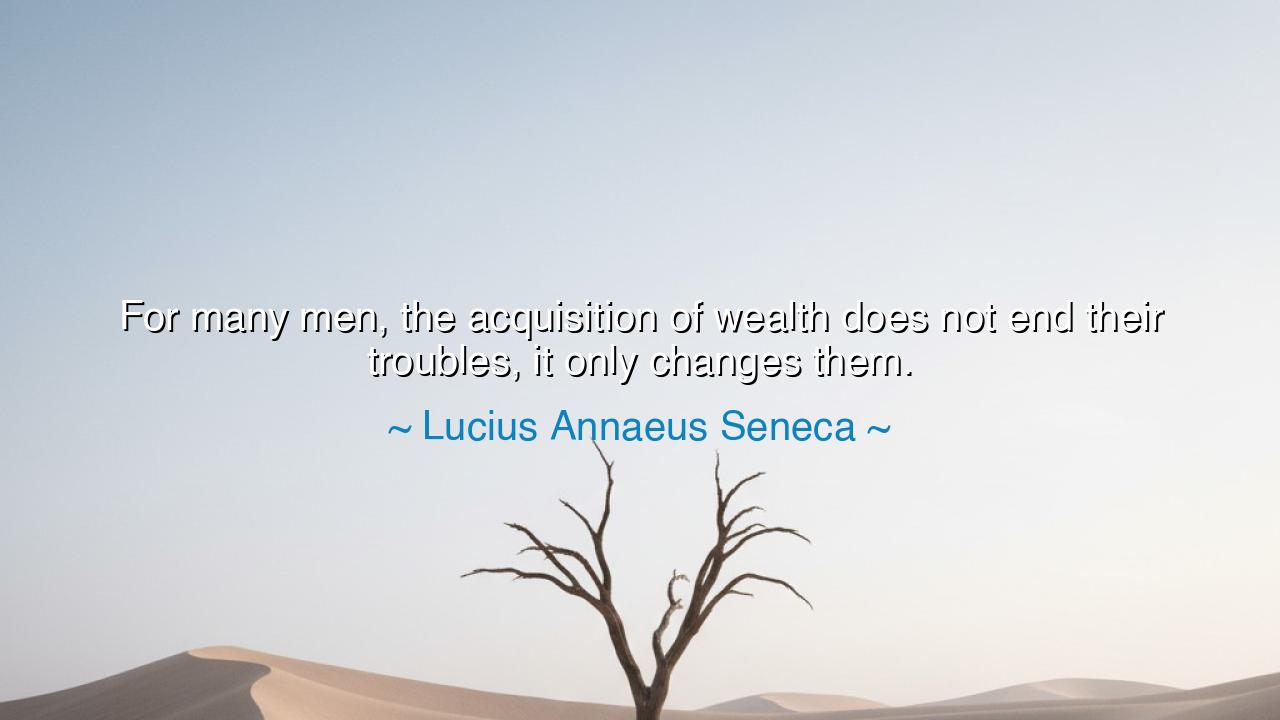
For many men, the acquisition of wealth does not end their
For many men, the acquisition of wealth does not end their troubles, it only changes them.






The words of Lucius Annaeus Seneca fall upon us like the stern voice of a teacher to his pupils: “For many men, the acquisition of wealth does not end their troubles, it only changes them.” In this single sentence, the Stoic philosopher unveils a paradox of human life—that gold does not dissolve sorrow, it only shifts its shape. Those who think riches bring peace discover instead that new anxieties arise, clothed differently but rooted in the same restless heart.
The origin of these words lies in the Stoic philosophy Seneca lived and taught during the turbulent days of Rome. He saw emperors, senators, and merchants rise to great wealth, only to be consumed by fear—fear of losing what they had gained, fear of envy from rivals, fear of the burden of luxury itself. Wealth, instead of granting freedom, often chained its masters more tightly. Seneca himself, though wealthy, spoke often of simplicity, warning that the soul cannot be healed by possessions.
History gives us vivid examples. Consider the emperor Midas of legend, who longed for wealth so much that he prayed for the golden touch. When his wish was granted, his food, his drink, even his beloved daughter turned to gold. His troubles were not erased, they were transformed into torment. In the same way, the rich man of Rome might exchange the worry of hunger for the worry of thieves, or the peasant’s fear of want for the noble’s fear of betrayal. Wealth shifted the burden, but did not lift it.
The truth Seneca names is also clear in the life of Marcus Licinius Crassus, Rome’s wealthiest man. His riches were beyond counting, yet he remained dissatisfied, longing for the military glory that wealth could not purchase. He died not in comfort, but in failure, defeated in the Parthian desert, his greed mocked by fate. In his story we see the Stoic warning fulfilled: the man who believes wealth will end his troubles discovers only that the shape of his troubles changes, but their weight remains.
Seneca’s teaching, then, is not to despise wealth itself, but to recognize its limits. Riches may ease the body but cannot quiet the mind. They may build houses but cannot build peace. They may banish poverty but cannot banish envy, greed, or fear. True freedom is not the absence of need but the mastery of desire. Thus the wise man learns to live content with little, knowing that wealth without wisdom is like wine without measure—it intoxicates but does not nourish.
The lesson for us is plain: do not chase riches as though they are the cure for your heart’s unrest. If fortune comes to you, use it well, but do not expect it to silence your soul’s hunger. Learn instead to seek virtue, discipline, and contentment, for these treasures no thief can steal, no misfortune can alter. As Seneca reminds us, to desire less is to be rich already.
Practical action lies before each of us: practice gratitude for what you already have. When wealth tempts you, ask whether you seek it for true need or for vanity. If fortune increases, guard your heart against the new troubles that follow—envy, pride, and fear of loss. If fortune declines, remember that the soul’s wealth is not measured in coin but in character.
So let Seneca’s wisdom be your guide: wealth does not end troubles, it only changes them. Therefore, seek not the shifting sands of fortune but the solid rock of inner strength. For he who governs his desires is richer than kings, and he who finds peace within himself possesses a treasure no wealth can match.






AAdministratorAdministrator
Welcome, honored guests. Please leave a comment, we will respond soon